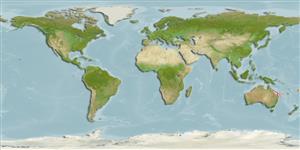Teleostei (teleosts) >
Perciformes/Scorpaenoidei (Scorpionfishes) >
Neosebastidae (Gurnard scorpionfishes)
Etymology: Neosebastes: Greek, neos = new + Greek, sebastes = august, venerable (Ref. 45335); johnsoni: Named for Jeffrey W. Johnson of the Queensland Museum.
Eponymy: Jeffrey W ‘Jeff ’ Johnson joined the Queensland Museum, Brisbane as a cadet (1977) and worked as assistant to the Curator of Fishes (1977–1995). [...] (Ref. 128868), visit book page.
Environment: milieu / climate zone / depth range / distribution range
Ecology
Marine; demersal; depth range 138 - 270 m (Ref. 54394). Tropical; 17°S - 28°S (Ref. 54394)
Western Pacific: Off northeastern coast of Queensland, Australia.
Size / Weight / Age
Maturity: Lm ? range ? - ? cm
Max length : 17.0 cm SL male/unsexed; (Ref. 54394)
Short description
Identification keys | Morphology | Morphometrics
Dorsal spines (total): 8; Dorsal soft rays (total): 8; Anal spines: 3; Anal soft rays: 5. Diagnosis: Underside of mandible with numerous tiny pores, no ridges. Preocular spine usually divided into 2 points, and flattened anteriorly and posteriorly. There are no additional spines between lacrimal and suborbital ridges. Upper opercular spine usually simple. Midinterorbital space usually covered with scales. Pored lateral-line scales 30-35 (mode 32); longitudinal scale rows 49-57 (52). Pectoral-fin rays 20-22 (21); pectoral fin long (2.6-3.0, mean 2.8 in SL), reaching or extending beyond a vertical at origin of last dorsal-fin spine. Posterior margin of maxilla not reaching a vertical at posterior margin of pupil. Interorbital width wide (5.5-7.1, 6.4 in HL). Bilobed portion of swimbladder approximately equal to half of total swim bladder length. There are numerous distinct small black spots on lateral line and posterior part of eye (spots absent in juveniles less than 50 mm SL); 1 or 2 large dark spots on cleithral spine (Ref. 54394).
Found on the continental shelf and continental slope (Ref. 75154). Juveniles less than 6.1 cm SL were caught at depths of 70 - 110 meters. Most specimens have sand grains inside the mouth indicating occurrence on open, predominantly sandy substrata (Ref. 54394).
Life cycle and mating behavior
Maturity | Reproduction | Spawning | Eggs | Fecundity | Larvae
Motomura, H., 2003. Revision of the scorpionfish genus Neosebastes (Scorpaeniformes: Neosebastidae), with descriptions of five new species. Indo-Pac. Fish. (37):46 p. (Ref. 54394)
IUCN Red List Status (Ref. 130435: Version 2024-2)
Threat to humans
Harmless
Human uses
Fisheries: bycatch
Tools
Special reports
Download XML
Internet sources
Estimates based on models
Preferred temperature (Ref.
123201): 18.6 - 21.4, mean 19.6 °C (based on 15 cells).
Phylogenetic diversity index (Ref.
82804): PD
50 = 0.5002 [Uniqueness, from 0.5 = low to 2.0 = high].
Bayesian length-weight: a=0.01995 (0.00906 - 0.04395), b=3.01 (2.83 - 3.19), in cm total length, based on all LWR estimates for this body shape (Ref.
93245).
Trophic level (Ref.
69278): 3.6 ±0.4 se; based on size and trophs of closest relatives
Fishing Vulnerability (Ref.
59153): Low vulnerability (11 of 100).
